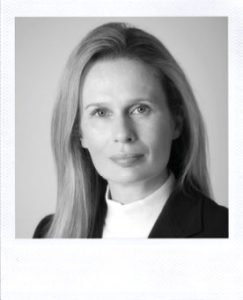 THE FM SOFTWARE EXPERT’S VIEW
THE FM SOFTWARE EXPERT’S VIEW
PENNY BRINSLEY,
ACCOUNT DIRECTOR, SERVICE WORKS GLOBAL
When it comes to ESG commitments and the role of the physical workplace, data is always core to these discussions and the resultant decisions. To be well-prepared for the challenges ahead, businesses must prioritise data collection and use that information as a starting point for changes. Accurate, timely data is necessary for businesses to make bigger and better commitments in 2024, inform where and how they can make savings, and reduce their environmental impact.
The quality of data is improving thanks to the growing use of IoT sensors in FM. Facilities managers can now visualise space usage by integrating occupancy data from these sensors with other existing information, such as building information models (BIM). By combining these data sources, organisations can create a digital twin, a dynamic, digital 3D replica that enables them to model scenarios and assess their effectiveness before making important decisions such as changes to a building’s workplace layout and size, allowing for better estate strategies. The physical workplace and its purpose will continue to mould and change against the trends of office occupancy, and the use of these technologies will support those changes.
Within this, we cannot overlook the growing presence of AI in our industry. Although AI was already a part of the FM toolkit, in the form of predictive maintenance, the emergence of generative AI platforms such as ChatGPT has led to an explosion of wider public interest in the technology. AI has the potential to transform decision-making in all areas of facilities and estate management, but it is contingent on good-quality data.
Offering high-quality services in the modern era requires an integrated approach with relevant technologies that streamline processes for efficiency. While technology can and will continue to do a lot for us, the ‘human touch’ and knowledge from a team of diverse individuals remains a key component to any successful business. AI should not be seen as a threat to jobs in FM, but rather an enabler of positive change.
A measured, considered approach, looking at the wider picture, where cost, energy and operational efficiencies can be gained is essential. Understanding what elements of your business can be enhanced through digital data, as opposed to “technology for technology’s sake” is the key. Starting small and building up your portfolio of building management technologies ensures they are implemented for the right reasons and will improve the return on investment as a result.
 THE PROPERTY SERVICES SPECIALIST’S VIEW
THE PROPERTY SERVICES SPECIALIST’S VIEW
VALERIE MILLER,
SALES & MARKETING DIRECTOR, DMA GROUP
Today, facilities professionals find themselves in a continuously evolving industry. The landscape shifts dramatically and regularly, and this demands an agile and adaptive response. The traditional notions of a static workplace are being challenged as we witness a re-evaluation of the role of the physical office. Remote work trends and changing expectations have prompted us to reconsider the fabric of our workspaces. It’s not just about square footage anymore; it’s about creating dynamic, flexible environments that cater to the evolving needs of a diverse workforce.
In pursuing excellence, the spotlight has intensified on sustainability and social value. As stewards of the built environment, facilities professionals are pivotal in driving initiatives beyond the balance sheet. We must actively contribute to the wellbeing of our communities, fostering a sense of social responsibility. My journey in this field has taught me the power of small, purposeful actions. Whether implementing energy-efficient practices or engaging with local communities, every effort counts towards creating a lasting impact.
Technology has become the cornerstone of effective facilities management. Embracing new technologies isn’t just a choice; it’s a necessity for survival and success. From predictive maintenance to intelligent building solutions, the opportunities are vast. Yet, the road to technological integration is challenging. It demands a willingness to learn, adapt, and sometimes confront the discomfort of change. The tech-savvy facilities manager will need to be poised to lead in this digital transformation era.
Economic uncertainties cast a long shadow affecting every decision and strategy. Delivering high-quality services becomes both a challenge and an imperative. We must innovate, optimise, and find new ways to maintain service excellence despite budget constraints. It requires a delicate balance, a keen understanding of priorities, technology adoption and a firm commitment to our core mission.
I’ve seen progress, but the gender split persists at 66 per cent male versus 34 per cent female—an imbalance that demands attention. Diversity and inclusion aren’t just buzzwords. They are vital for industry success. Diverse perspectives enhance decision-making, fuelling innovation and resilience. It’s time to breakdown stereotypes, dismantle barriers, and create an inclusive culture where every professional thrives. Taking action, I’ve committed to the Women In FM (WIFM) committee this year, a step towards amplifying women’s voices and fostering a more balanced and equitable industry.
During this transformative period, the onus of change doesn’t solely rest on facilities professionals. Customers and service providers must re-evaluate their behaviours too. It’s a two-way street which demands collaboration and a shared commitment to industry-wide improvement. From clearer communication to a willingness to embrace new paradigms, behavioural change catalyses a smarter future.
In conclusion, the facilities management sector stands at the rock face of significant change. The challenges are vast, but so are the opportunities. In this digital age, let’s not forget the human element—the diverse, resilient, and adaptable professionals who are the heartbeat of our industry. We can transform challenges into stepping stones towards a more resilient future by embracing change, fostering inclusivity, and championing sustainability.





